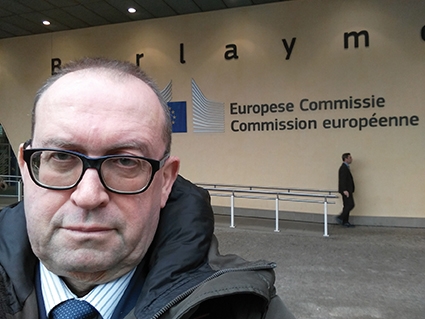Bulgaria Promises to Enhance Bilateral & Multilateral Relations with Georgia
Interview
In 2017, Georgia and Bulgaria celebrated the 25th anniversary of the re-establishment of diplomatic relations. This year, Bulgaria will take over the Presidency of the Council of EU. GEORGIA TODAY offers an interview with Doctor Georgi Panayotov, Special Coordinator on Eastern Partnership, Head of Caucasus and Central Asia Department, Eastern Europe and Central Asia Directorate, which we recorded during the media tour of Georgian journalists to Sofia, Bulgaria.
“As you know, there are deep historical ties between Bulgaria and Georgia, which establishes a nourishing basis for the current (very good) bilateral cooperation in all spheres: politics, economy and culture,” Panayotov tell us. “We have no current issues concerning the bilateral relations. The pro-European and pro-Atlantic orientation of the Georgian government’s foreign policy very much boosts our cooperation.”
Tell us more about the political cooperation
It is really intense. Last June, our Minister of Foreign Affairs, Mrs. Zaharieva, took part in a ministerial meeting between the heads of foreign ministries of EU and Eastern partnership countries. Later, we delivered bilateral political consultations on the level of deputy foreign ministers. In September, Mr. Dolidze, your Minister of European and Euro-Atlantic Integration, visited Bulgaria for a meeting that turned out really very fruitful.
In 2017, we celebrated the 25th anniversary of re-establishing our diplomatic relations. Georgia is a very important partner for Bulgaria within the framework of the Eastern Partnership and there is a well-developed bilateral exchange between the legislative bodies of the two countries.
As for the frozen conflicts, Bulgaria’s official position is unchanged in supporting Georgia’s sovereignty and territorial integrity. We also back the Geneva Talks and European Union Monitoring Mission.
Tell us about the current commercial turnover between the two countries
It is around $340 million. However, that does not reflect our potential, which is much larger. Our economic ties are developing well, though they could and should be enhanced even further. Sadly, the turnover has declined, from around S400 million dollars in 2015, to $340 million in 2016. It is a complex issue. Import from Georgia to Bulgaria decreased. However, our trade turnover with Kazakhstan is $12 million. So, our bilateral economic exchange is not small. The DCFTA is playing a very positive role. I can’t give you the exact figures, but Bulgarian import to Georgia represents approximately $200 million, and Georgian import to Bulgaria represents around $140 million.
As for bilateral ties in terms of infrastructure, they are important too, representing part of the infrastructural ties between Europe and Asia. We hope for more diversified provisions of gas via Azerbaijan and Georgia. A very important transport project ‘Transport Corridor - Persian Gulf and Black Sea’ is developing very successfully. It is also notable that Georgia has joined the European Energy Community of the European Commission. We are ready to help Georgia in implementing European legislation. The trilateral project about food safety between Bulgaria, the US and Georgia is also coming on nicely.
In November, the 5th Eastern Partnership Summit took place
Yes. These summits take place once every two years and represents a steadily evolving initiative. The agreements made within the framework of the summits are really tangible: take the Association Agreement and visa-free regimes, for example, something that directly reflect on the populations. Our official assessment of this summit is high. We reached a very well-balanced declaration by which we believe that Eastern Partnership (EP) countries represent equal partners not only for the EU but also for our other partners. The topics were: energy security, development of market economy, good governance, democratization and respect for human rights. The summit gave an impulse to develop four main directions within EP countries: stronger economy, stronger institutions and good governance, stronger energy ties, and stronger human contacts.
We intend to differentiate our approach to EP countries, as they are each unique. I can state on behalf of Bulgaria, as the forthcoming President Country of the Council of Europe, that the EP remains a priority for the EU in 2018, with the focus on deepening our ties in terms of transport and energy. The European Development Foundation is to be established that will work specifically on issues related to Georgia, Moldova and Ukraine.
What about other projects?
We also have very good relations via international organizations. Bulgaria very successfully backed the Georgian candidate for Secretary General of the UN World Tourism Organization, Ambassador Zurab Pololikashvili. We also backed the Georgian candidacy in 2016-2018 for the United Nations Human Rights Council. Now, Bulgaria expects Georgian support for 2019-2021. We will try to increase opportunities in the Erasmus+ program for students of EP countries, as well as to boost cultural cooperation on the bilateral level. We want to develop not only government-to-government, but also business-to-business, civil-to-civil, media-to-media and other social categories.
We also have very good relations in the fields of culture and science. Recently, we presented a complete library to the Georgian Ministry of Environmental Protection, the Bulgarian Science Foundation signed a memorandum of cooperation with the Shota Rustaveli Foundation, and a new program is already underway for cultural cooperation between the ministries of culture of the two countries. There are a lot of Bulgarian expositions held in Tbilisi. The Bulgarian Ministry is very active in Georgia.
Maka Lomadze












